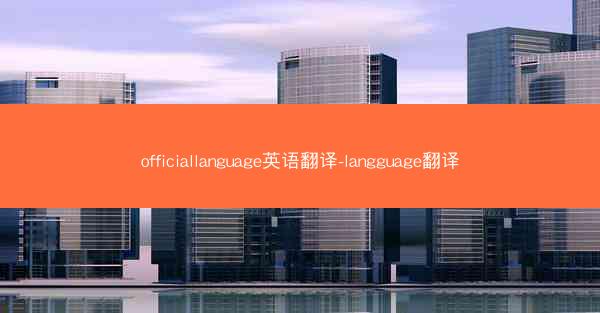officiallanguage英语翻译-langguage翻译

This article delves into the concept of official language English translation, focusing on the translation of language itself. It explores the significance of official languages in various countries, the challenges and strategies involved in translating language accurately, and the impact of such translations on cultural exchange and global communication. The article is structured into six main sections, each addressing a different aspect of official language English translation.
---
Introduction to Official Language English Translation
Official language English translation, often referred to as language translation, plays a crucial role in global communication. It involves the accurate and culturally sensitive translation of terms related to language, linguistics, and communication. This form of translation is essential in countries where English is an official language, as it facilitates government, legal, and educational processes. The translation of language itself is complex, as it encompasses not only the linguistic aspects but also the cultural and political dimensions.
Significance of Official Languages
Official languages are the languages that are recognized by the government of a country as having a special role in its society. In many countries, English is one of the official languages, alongside other languages such as Spanish, French, or Mandarin. The translation of language in official English is significant for several reasons:
1. Legal and Government Documents: Official language English translation ensures that legal and government documents are accessible to all citizens, regardless of their native language. This is crucial for maintaining transparency and accountability in public administration.
2. Educational Purposes: In educational settings, the translation of language helps in creating inclusive curricula that cater to diverse linguistic backgrounds. It allows students to understand and engage with educational materials in their native language.
3. Cultural Exchange: The translation of language facilitates cultural exchange by breaking down language barriers and enabling people from different linguistic backgrounds to communicate effectively.
Challenges in Translating Language
Translating language accurately is a complex task due to several challenges:
1. Cultural Context: The term language can have different connotations and cultural meanings in different languages. Translators must be aware of these nuances to ensure accurate translation.
2. Linguistic Complexity: The linguistic structure of language in English can be quite different from other languages, making it difficult to find equivalent terms.
3. Technical Terminology: The translation of technical terms related to linguistics requires specialized knowledge and expertise.
Strategies for Effective Translation
To overcome the challenges of translating language, translators employ various strategies:
1. Cultural Adaptation: Translators adapt the term language to fit the cultural context of the target language, ensuring that the translation is both accurate and culturally appropriate.
2. Use of Equivalents: When possible, translators use equivalents that convey the same meaning in the target language.
3. Consultation with Experts: Translators often consult with linguists and subject matter experts to ensure the accuracy of technical terms.
Impact on Global Communication
The translation of language in official English has a significant impact on global communication:
1. Enhanced Understanding: Accurate translations help in enhancing mutual understanding between people from different linguistic backgrounds.
2. Facilitation of International Trade: In countries where English is an official language, the translation of language facilitates international trade and business transactions.
3. Promotion of Multilingualism: The translation of language promotes multilingualism and encourages the use of multiple languages in global communication.
Conclusion
Official language English translation, particularly the translation of language, is a critical aspect of global communication. It ensures that legal, educational, and cultural materials are accessible to a diverse range of people. The challenges and strategies involved in this form of translation highlight the importance of cultural sensitivity, linguistic expertise, and the need for continuous improvement in translation practices. As the world becomes increasingly interconnected, the accurate translation of language will continue to play a vital role in fostering understanding and collaboration across linguistic and cultural boundaries.










